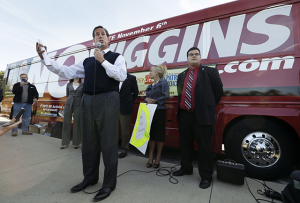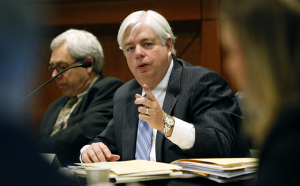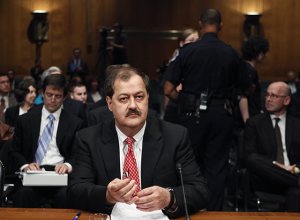The majority of U.S. states elect their judges (these 33 are holding elections this year), and the judicial system, meant to be the most impartial branch of our government, has not been immune to the influx of cash into political campaigns. A series of recent Supreme Court rulings striking down campaign finance laws has paved the way for corporate interests, political parties and activists to influence judicial campaigns. When the U.S. Supreme Court ruled against precedent on Citizens United v. Federal Elections Commission (2010), Justice John Paul Stevens included a warning in his dissenting opinion.
“…the consequences of today’s holding will not be limited to the legislative or executive context. The majority of the States select their judges through popular elections. At a time when concerns about the conduct of judicial elections have reached a fever pitch […] the Court today unleashes the floodgates of corporate and union general treasury spending in these races […] This will be small comfort to those States that, after today, may no longer have the ability to place modest limits on corporate electioneering even if they believe such limits to be critical to maintaining the integrity of their judicial systems.”

Former Republican presidential candidate Rick Santorum speaks before the start of a bus tour campaign by Iowans for Freedom that is trying to convince Iowans to vote off the bench Iowa Supreme Court Justice David Wiggins in November, Monday, Sept. 24, 2012, in Des Moines, Iowa. (AP Photo/Charlie Neibergall)
Over the last few years, Iowa, Florida, North Carolina and Michigan have all become battlegrounds in the fight to maintain impartial, nonpartisan courts.
In Iowa, in the wake of the state Supreme Court’s unanimous ruling in 2009 to recognize same sex marriage, three of the state’s justices were unseated in 2010 retention elections. This year, a fourth justice, David Wiggins, is up for retention. A group called Iowans for Freedom, run by Conservative activist Bob Vander Plaats, is attempting to unseat him with the help of some influential conservatives, including Rick Santorum and Louisiana Governor Bobby Jindal. In September, The New York Times editorial board called the vote in Iowa “a battle over the future of a fair and independent judiciary.”

Iowa Supreme Court Justice David Wiggins, right, participates in a discussion in Des Moines, Iowa. Wiggins isn’t well known outside the legal community of his state, but whether he should keep his job has become one of the most fiercely contested judicial issues on the Nov. 6 ballot because of what he symbolizes in the debate over gay marriage. (AP Photo/Charlie Neibergall, File)
Wiggins chose not to run a campaign to defend himself, and explained his decision in an op-ed in the Des Moines Register:
“Campaigns are political. They require candidates to count votes and appeal to donors. That system has created a big enough mess in Congress. It has no business in the courts. Judges should be beholden only to the constitution and the law. They should not please donors or appease potential critics. I do not want Iowa to end up like states with highly partisan courts. Iowa is better than that.”
In Florida, three state Supreme Court justices are up for retention, and a group called Restore Justice 2012 is trying to have them thrown out with help from the Koch brothers’ super PAC Americans for Prosperity. The conservative group targeted the justices because they were part of a five-vote majority ruling that prevented a misleadingly-worded constitutional amendment from being placed on the ballot in 2010. Conservatives hoped that, if passed, the amendment would have allowed Florida to opt-out of Obamacare. If Restore Justice is successful, it will be the first time in over 40 years that a Florida Supreme Court justice has been removed.
Unlike Justice Wiggins in Iowa, the Florida justices are fighting back. The New York Times editorial board writes:
“The three Florida justices are mounting active campaigns. They have raised about $1 million collectively, a reluctant but realistic concession to the need to fight back. Even so, and despite the support of 23 past presidents of the Florida Bar Association, the fire and police unions, and some prominent state Democrats, their retention is by no means assured.
“What is absolutely certain is the damaging message of intimidation that would flow from their removal.”
North Carolina was the first state to have voluntary public financing for judicial campaigns, and this year, for the first time, all candidates have opted in to that system. But the race has also spawned the first judicial campaign super PAC, directed by the state’s former Republican Party chair. Though the candidates have chosen to limit their own campaigns to the $240,100 the state provides, the super PAC is throwing its weight around to benefit a conservative incumbent, Justice Paul Newby, who has opposed allowing same-sex couples to adopt, and gives conservatives a 4-3 advantage over liberals on the North Carolina Supreme Court.
More money has been spent on judicial campaigns in Michigan than anywhere else. Candidates spent $2.6 million in 2010 — $11.4 million was spent on the campaigns including outside spending. This election, nominees have raised $2.26 million.
Other states have also been burdened with a partisan judiciary. An August report from the Center for American Progress outlines specific examples from Alabama, Texas, Ohio, Nevada, Wisconsin and Michigan. The report’s introduction tells this story from West Virginia:
A party to a lawsuit in West Virginia repeatedly asked a state supreme court justice to recuse himself after an executive with the opposing party, a coal company, spent more than $3 million through an independent entity to support the judge’s election. The judge refused and cast the deciding vote overturning a $50 million verdict against the coal company. In 2009 the U.S. Supreme Court ruled the judge should have recused himself. The court noted that the executive’s contribution was three times more than the spending by the justice’s own campaign.

Massey Energy Company Chief Executive Officer Don Blankenship prepares to leave Capitol Hill in Washington, Thursday, May 20, 2010, after answering questions before the Senate Health and Human Services subcommittee hearing on mine safety. (AP Photo/Carolyn Kaster)
This West Virginia case, Caperton v. Massey, demonstrated coal giant Massey Energy’s power to obstruct justice. The court ruled on it a year before it ruled on Citizens United. In the Opinion of the Court, Justice Kennedy quoted an opinion he wrote for a 2002 decision, Republican Party of Minn. v. White.
“Courts, in our system, elaborate principles of law in the course of resolving disputes. The power and the prerogative of a court to perform this function rest, in the end, upon the respect accorded to its judgments. The citizen’s respect for judgments depends in turn upon the issuing court’s absolute probity. Judicial integrity is, in consequence, a state interest of the highest order.”
But in the wake of Citizens United, what Justice Kennedy describes as the state court’s “probity” (honesty and decency) and “judicial integrity” could be up for grabs to whoever raises the most money.

